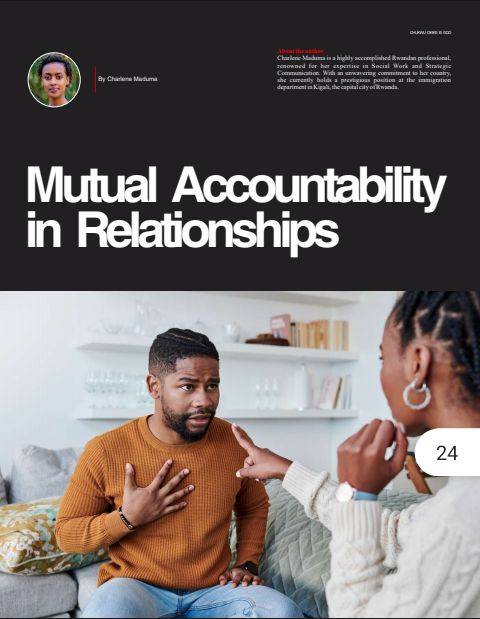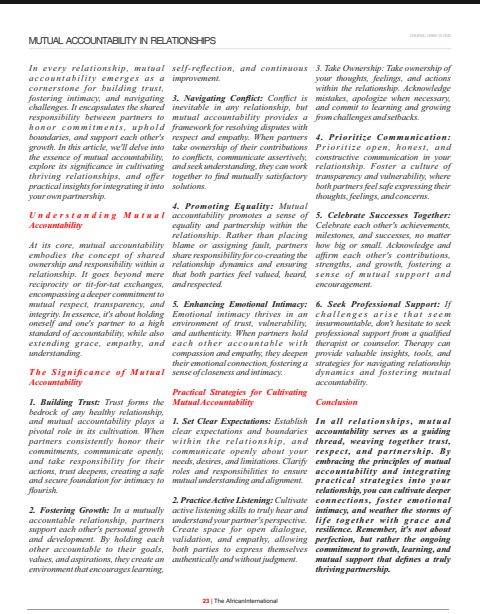By Charlene Maduma

In every relationship, mutual accountability emerges as a cornerstone for building trust, fostering intimacy, and navigating challenges. It encapsulates the shared responsibility between partners to honor commitments, uphold boundaries, and support each other’s growth. In this article, we’ll delve into the essence of mutual accountability, explore its significance in cultivating thriving relationships, and offer practical insights for integrating it into your own partnership.
Understanding Mutual Accountability
At its core, mutual accountability embodies the concept of shared ownership and responsibility within a relationship. It goes beyond mere reciprocity or tit-for-tat exchanges, encompassing a deeper commitment to mutual respect, transparency, and integrity. In essence, it’s about holding oneself and one’s partner to a high standard of accountability, while also extending grace, empathy, and understanding.
The Significance of Mutual Accountability

1. Building Trust: Trust forms the bedrock of any healthy relationship, and mutual accountability plays a pivotal role in its cultivation. When partners consistently honor their commitments, communicate openly, and take responsibility for their actions, trust deepens, creating a safe and secure foundation for intimacy to flourish.
2. Fostering Growth: In a mutually accountable relationship, partners support each other’s personal growth and development. By holding each other accountable to their goals, values, and aspirations, they create an environment that encourages learning, self-reflection, and continuous improvement.
3. Navigating Conflict: Conflict is inevitable in any relationship, but mutual accountability provides a framework for resolving disputes with respect and empathy. When partners take ownership of their contributions to conflicts, communicate assertively, and seek understanding, they can work together to find mutually satisfactory solutions.
4. Promoting Equality: Mutual accountability promotes a sense of equality and partnership within the relationship. Rather than placing blame or assigning fault, partners share responsibility for co-creating the relationship dynamics and ensuring that both parties feel valued, heard, and respected.
5. Enhancing Emotional Intimacy: Emotional intimacy thrives in an environment of trust, vulnerability, and authenticity. When partners hold each other accountable with compassion and empathy, they deepen their emotional connection, fostering a sense of closeness and intimacy.
Practical Strategies for Cultivating Mutual Accountability
1. Set Clear Expectations: Establish clear expectations and boundaries within the relationship, and communicate openly about your needs, desires, and limitations. Clarify roles and responsibilities to ensure mutual understanding and alignment.
2. Practice Active Listening: Cultivate active listening skills to truly hear and understand your partner’s perspective. Create space for open dialogue, validation, and empathy, allowing both parties to express themselves authentically and without judgment.
3. Take Ownership: Take ownership of your thoughts, feelings, and actions within the relationship. Acknowledge mistakes, apologize when necessary, and commit to learning and growing from challenges and setbacks.
4. Prioritize Communication: Prioritize open, honest, and constructive communication in your relationship. Foster a culture of transparency and vulnerability, where both partners feel safe expressing their thoughts, feelings, and concerns.
5. Celebrate Successes Together: Celebrate each other’s achievements, milestones, and successes, no matter how big or small. Acknowledge and affirm each other’s contributions, strengths, and growth, fostering a sense of mutual support and encouragement.
6. Seek Professional Support: If challenges arise that seem insurmountable, don’t hesitate to seek professional support from a qualified therapist or counselor. Therapy can provide valuable insights, tools, and strategies for navigating relationship dynamics and fostering mutual accountability.
Conclusion
In all relationships, mutual accountability serves as a guiding thread, weaving together trust, respect, and partnership. By embracing the principles of mutual accountability and integrating practical strategies into your relationship, you can cultivate deeper connections, foster emotional intimacy, and weather the storms of life together with grace and resilience. Remember, it’s not about perfection, but rather the ongoing commitment to growth, learning, and mutual support that defines a truly thriving partnership.
| ReplyReply to allForwardAdd reaction |

